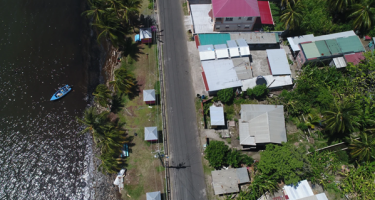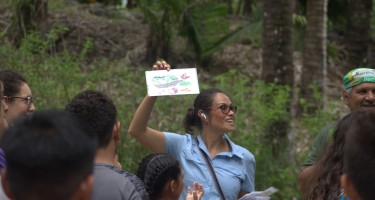Building Resilience in the Caribbean
Explore the progress of the Resilient Caribbean Communities Project in 2024.

© Welthungerhilfe/H.Maass
A hot afternoon in the Dominican Republic: implementing partners of the Resilient Caribbean Communities (RCC) Project are putting the finishing touches on new EbA (Ecosystem-based Adaptation) plans for their regions. These plans describe in detail how communities can respond to the growing challenges of climate change, from the selection of resilient tree species to adapted and more efficient irrigation methods. In neighboring Haiti and Cuba, findings from participatory workshops and climate risk analyses have also been incorporated into local EbA plans, which will serve as a strategy for communities to adapt to climate change. In the coming year, all of these plans will be publicly available on the Project's website (https://ccr-project.com).
Numerous Measures To Increase Resilience
So far, more than 1.7 million plants have been planted through the project: fruit trees, native tree species and crops. Thanks to the project, which Welthungerhilfe is carrying out together with OroVerde and local partner organizations, water supply has also been ensured for some 700 households, and EbA measures have been implemented in more than 1,200 households. So far, more than 2,200 hectares of degraded forests and fields have been cultivated, planted and protected. In addition, awareness campaigns have reached almost 10,000 people. These campaigns are as diverse as the project itself: training courses, village meetings and climate change information events are helping to create widespread awareness of the need to protect the environment as a way of adapting to climate change.
Other measures are not just on paper, but are already having an effect on the ground. Agroforestry, silvopastoral systems and erosion control measures have been implemented in several regions. In many households, tree nurseries, reforestation projects and new orchards are helping to protect the soil and increase self-sufficiency.
"The trees we plant are a promise," says Alexander Voets, director of the Welthungerhilfe Project, "they are our answer to increasing droughts and floods."
Gender Equality, Key To A Sustainable Project
The Resilient Caribbean Communities Project goes far beyond adaptation actions. One of the main findings of this year's project is the importance of gender equality in environmental work. In recent months, training sessions on a gender-sensitive EbA approach have been held in all project regions, demonstrating how closely linked the role of women is to biodiversity protection and climate adaptation measures. The Dominican Republic partners worked hard on publishing their main findings in a knowledge product, explaining how they want to strengthen the role of women through climate adaptation.
Cooperation With Political Actors Strengthens the Project
The Multi-Actor-Partnerships (MAP) approach also demonstrates how strong collaboration pays off for local people. Since the start of the project, 16 local "container" groups have already been established in all regions of the project partner organizations, networks in which local residents, community representatives and project partners meet regularly to plan EbA measures and develop EbA plans together. The long-term goal is to create a "culture" of continuous adaptation to climate change in the project regions, so that the regions and their populations are better prepared for the consequences of climate change through sustainable land use, protection of forests and water sources, and systematic disaster risk reduction. Local stakeholder groups and networks are working in this direction together with mayors. To ensure that EbA is also better anchored in the laws and regulations of the respective countries, cooperation with political actors is also of vital importance to ensure the long-term success of the project. In this respect, the project also cooperates with the respective ministries of environment and the Caribbean Biological Corridor (CBC) Secretariat.
Future Prospects
The year 2024 shows how comprehensive and multifaceted the Resilient Caribbean Communities Project is. From the concrete implementation of EbA measures and the empowerment of women to cooperation with political actors in the Caribbean, the work continues.
The project's technical coordinator Johannes Horstmann sums it up: "Every tree, every training course and every partnership is a step towards a more resilient future."
- Country: Cuba, Haití, Dominican Republic
- Project:
- Contact:


